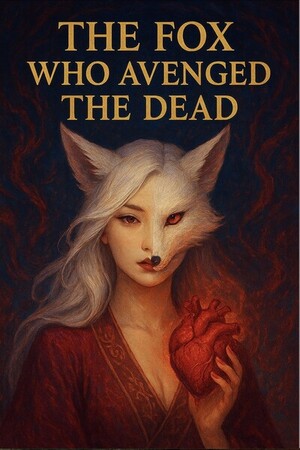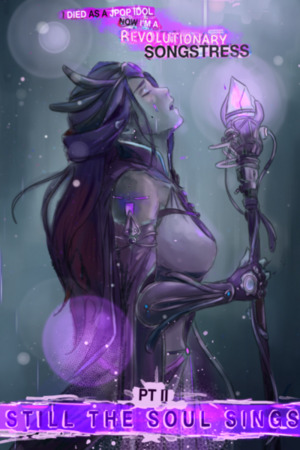Chapter 7:
The Legend of the Black-Faced Queen
The Fox Who Avenged the Dead
Another winter had come — a bitter, bone-chilling winter that clawed straight into the soul.
Through the endless white expanse trudged a servant in a blue robe, his round little body struggling through snow that reached his waist. Each step sank deep into the frozen crust, and worse still, he dared not move too quickly. For in his mittened hands he held a single delicate thing — a transparent frost blossom, gleaming faintly in the pale light.
The boy’s face was red with cold and fury alike. He muttered curses under his breath, all directed toward a certain man sitting comfortably inside a carriage, sipping tea and nibbling on pastries. The memory of that man’s voice still echoed in his skull — cold, lazy, and edged with amusement.
“This frost blossom is rare — it grows only in the Mershan Forest, between the borders of the Western Han and Eastern Yi kingdoms. Go fetch it for me.”
The man had lifted his teacup, dark eyes glinting with mockery. “And if you return without the flower, don’t bother returning at all.”
The servant, Shishu, shivered at the thought of that smile — the kind that promised death wrapped in honeyed words.
That man, his master, was none other than Prince Gu Yi of the Eastern Yi Kingdom.
To speak of Gu Yi was to summon both admiration and pity. And to speak of his father, the old emperor of Eastern Yi, was to invite a sigh for the whole kingdom’s fate.
Gu Yi was the emperor’s fourth son. In theory, being the fourth should have placed him far from succession, but in truth, he was the only viable heir left. The aging emperor, who had spent more than half his life steeped in the company of concubines and wine, had sired only four sons and a legion of daughters.
The eldest prince was obsessed with women — and utterly disinterested in power.
The second prince was obsessed with men — and equally disinterested in power.
The third prince cared for neither men nor women — nor anything else, least of all the throne.
And so, by process of elimination, all hopes rested on the fourth: Gu Yi.
His very birth was an accident — one that nearly ended in blood.
When the emperor, already nearing fifty, realized his first three sons were all useless, he decided to defy fate one last time. One fateful night, emboldened by wine and despair, he took a palace maid to bed. The result of that single reckless act was a child who would one day become Gu Yi.
But fate has always been cruel to bastards born in golden cages.
While the first three princes were born of the empress herself, Gu Yi’s mother was a common maid — a sin that nearly cost both their lives. Poisoned soups, cursed charms, and assassins’ daggers haunted her pregnancy. Yet somehow, both mother and child survived.
Whispers say that Heaven itself turned its face away the day Gu Yi was born — for every life spared by mercy must be paid for in suffering later.
The empress’s jealousy was legendary. When she failed to kill the unborn child, she spent the next decade trying to finish what she started. Poisoned sweets, rigged horse carriages, "accidental" drownings — none succeeded. Gu Yi survived every attempt, each time colder, quieter, sharper.
The emperor’s heart ached — but not for the boy. His grief was for his kingdom, which still had no worthy successor. So, defying the empress’s will for the first time in his life, he sent Gu Yi away to live among commoners.
A prince became an orphan, growing up nameless in a temple until the age of eleven. Only when he came of age to study was he recalled to court — pale, polite, unreadable.
People said he had once been kind, gentle even, but that kindness had since turned to ice. By the time he reached twenty, he spoke little, smiled less, and seemed more ghost than man.
Why he changed, none dared to ask. Royal secrets were not for mortal tongues.
Shishu, trudging through the snow, rubbed his numb neck and decided that keeping his head attached to his body was far warmer than losing it. He quickened his pace, imagining the prince’s cold gaze watching from behind the carriage curtains.
The world was silent but for the crunch of snow beneath his boots. Every few steps, he thought he heard something following him — soft, deliberate. When he spun around, there was nothing. Again and again, the unease grew until tears pricked his eyes and warmth spread traitorously down his legs.
That was when he remembered the prince’s story.
“Once,” Gu Yi had said lazily by the campfire, “there was a girl named Xiao Cui. One winter, she went into the mountains to collect pinecones. She never came back.”
Shishu had listened, trembling, as Gu Yi’s calm voice painted horrors.
“Her parents searched all night. They found her basket under a pine tree, pinecones scattered, and bear tracks in the snow. Everyone assumed the bear had eaten her.”
“Years later, a madwoman returned to the village, clutching a furry child in her arms. It was Xiao Cui — alive, but broken. She had been taken not by a bear, but by a creature that looked like one — a man-beast covered in fur. He kept her in his cave, made her his wife, and she bore him a child — half-human, half-monster.”
“That child grew up wild, fierce, ruling the forest with her teeth and claws. They call her the Black-Faced Queen now — the demon of Mershan Forest.”
By the time Gu Yi had finished, Shishu was shaking like a leaf.
And then came the cruel jest:
“Tsk, tsk,” Gu Yi had mused. “You’re fifteen now, Shishu, and still unmarried. Perhaps I should find you a lady of the forest — let her ‘break you in’ a little.”
Shishu had burst into tears on the spot.
Truly, serving Prince Gu Yi was no work for mortals. It wasn’t just the endless errands, the sleepless nights, or the icy threats. It was the constant fear that one day, the prince’s dark humor might turn from teasing to action.
Everyone at court knew the prince’s temperament. Outwardly calm, inwardly cruel — he found delight in mischief, and the more terrified his victims were, the more he smiled. After all, he was still young, barely twenty, and boredom was his greatest enemy.
Their journey had taken them through Mershan Forest, just as the blizzards sealed the mountain passes. For five days they were trapped in snow, the prince confined to his carriage, bored beyond measure. Out of sheer mischief, he invented stories of the Black-Faced Queen — a beast-woman who prowled the woods for men to make her husbands.
But some truths hid within those tales.
Mershan Forest did have its legends. Travelers swore they’d seen the creature — half-bear, half-woman, her face smeared in black mud, her teeth long as daggers. Some said she wore a bear’s skin; others claimed she was simply born that way.
The stories varied wildly, but certain details remained the same. The Black-Faced Queen was female, terrifyingly strong, and hopelessly obsessed with lust and curiosity. She was said to prowl the roads, capturing handsome men, forcing them to explain the erotic “spring scrolls” she collected — illustrations of acts she couldn’t quite understand.
“Show me what this means,” she would demand, pointing to the drawings of ‘the Lotus of Guanyin’ or ‘the Old Man Pushes the Cart’. Most men fainted before they could explain; those who didn’t were never seen again.
But the locals had learned her rules. To pass safely through Mershan, one only needed to bury a few fresh erotic scrolls beneath the ancient cypress at the forest’s edge and whisper:
“A humble traveler leaves a small tribute. May the Black-Faced Queen accept our gift.”
Those who paid their dues were spared. Those who didn’t were dragged into the mountains, never to return.
The prince, of course, found all this delightfully absurd.
He had no intention of meeting any such “hungry ghost of desire.” But his love for rare flora was genuine. And Mershan’s frost blossoms — those ethereal flowers of ice and spirit — were worth a prince’s curiosity.
So the task fell, naturally, to poor Shishu.
He hated it with every fiber of his being, but disobedience was worse than death. He had barely slept for days, haunted by Gu Yi’s tale. Each time he shut his eyes, he dreamed of the monster-woman bursting into his tent, dragging him away to be her “bridegroom.”
And now, trudging alone through the snow, he could swear he heard footsteps behind him again — crunch, crunch, crunch.
Then, a heavy hand — rough, furry — landed on his shoulder.
Shishu didn’t even scream. He simply fainted dead away, the frost blossom falling from his hand, shattering like crystal in the snow.




Please sign in to leave a comment.